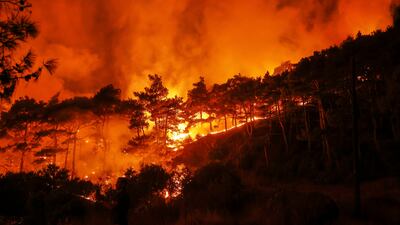Syrian firefighters were evacuating people from their homes in the Latakia countryside on Tuesday as wildfires advanced "dangerously close" to populated areas.
The forest fires have been burning since last Wednesday across coastal regions that are home to most of Syria's green cover, fanned by strong winds and high temperatures.
Neighbouring countries have stepped in to help, with Turkey and Jordan sending fire engines and planes to help contain the blazes.
On Tuesday, Syrian state news agency Sana said the fires had expanded to areas near Al Ghassaniya village in the Ras Al Basit district of Latakia, where they were approaching homes as the wind speed accelerated.
Firefighters were working to halt the fire’s advance and evacuate residents, said Abdul Kafi Kayyal, director of Syria's civil defence in the coastal region.
The flames are now "dangerously close to populated areas in Al Ghassaniya, and teams are making every effort to contain the blaze", Sana quoted him as saying.
Wildfires devastate Latakia
Raed Al Saleh, Syria's Minister of Emergency and Disaster Management, previously described the wildfires as “one of the most difficult" to tackle due to the rugged terrain.
The region contains most of Syria's green space, covering about 4,000 square kilometres, or 2 per cent of the nation's land mass, according to data recorded in 2010 before Syria's civil war broke out.
Decades of illegal logging along with unlicensed building and farming, particularly during the 13-year war, have compromised the country's forests.
Besides Latakia, the fires have also ravaged the Baniyas and Tartous governorates.
Syria, once a regional breadbasket, is undergoing one of its worst droughts in decades. In the late 2000s, the country became a wheat importer due to a lack of rain and the illegal use of water wells, which affected underground reservoirs.










